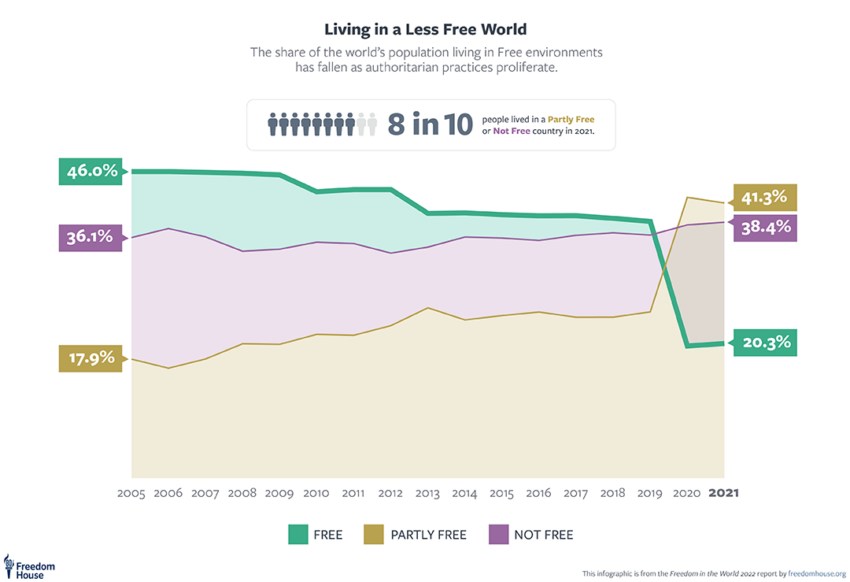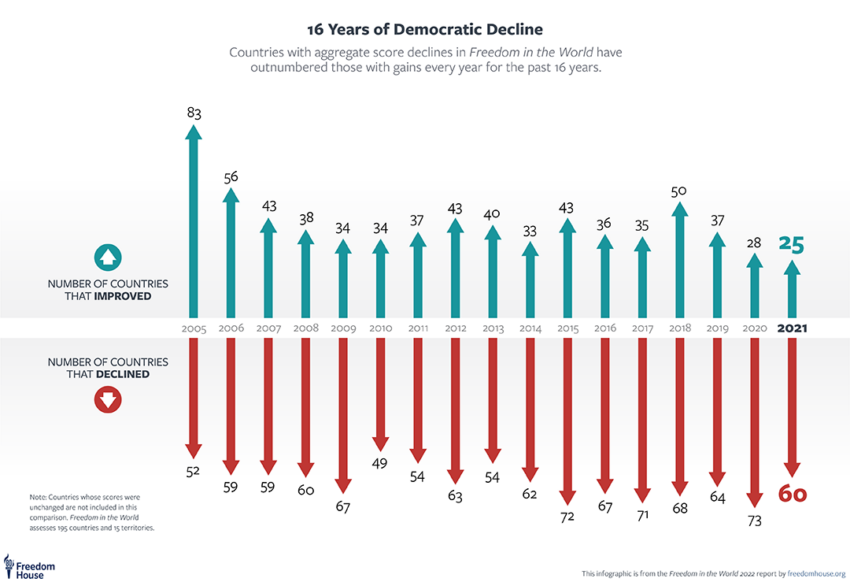Blockchain
In an period the place democracy is beneath siege, the seek for a safe and reliable voting system has by no means been extra pressing. Enter blockchain know-how, with its potential to revolutionize the best way we vote and safeguard the democratic course of.
However as we delve into the professionals and cons of this rising know-how, one should ask: Can blockchain actually assist safe democracy? Let’s discover the chances, challenges, and real-world examples of implementing blockchain within the electoral course of.
Authoritarianism and the Promise of Blockchain Voting
As authoritarianism surges in nations like Brazil, Turkey, and, some say, the US, democracy faces unprecedented challenges. Correct and clear voting is essential for sustaining democratic values.
Blockchain know-how gives a possible answer for safe, tamper-proof voting. Regardless of verified outcomes, round 40% of People imagine the final presidential election was “stolen,” elevating questions concerning the know-how’s effectiveness in making certain electoral belief.
Not all US voters in 2020 credited the outcomes of the elections, however distant voting nonetheless has unexplored potential.
The Promise of Blockchain
Blockchain voting ensures transparency and integrity within the election course of. By recording every vote as an encrypted transaction on a decentralized ledger, blockchain ensures votes are irreversible, traceable, and auditable. This prevents tampering and strengthens the credibility of the method.
Furthermore, blockchain voting techniques can use good contracts to automate varied election duties, reminiscent of voter registration, vote tallying, and end result declaration, additional bolstering belief within the system. Moreover, blockchain-based voting techniques can enable for third-party audits, offering much more transparency to the electoral course of.
Using decentralized and encrypted ledgers, blockchain considerably diminishes the dangers of voter fraud and hacking. The decentralized nature of blockchain techniques makes it tough for malicious actors to govern the system. Every node within the community verifies transactions, making it practically unattainable for unauthorized entry or information modification to go unnoticed.
The usage of cryptographic signatures can be certain that solely eligible voters can solid their votes, stopping potential fraud. Moreover, a distributed denial-of-service (DDoS) assault, which is a typical menace to conventional voting techniques, can be much less efficient towards a decentralized system.
Distant and safe voting choices can enhance voter turnout by eradicating geographical obstacles and making the method extra accessible. Blockchain know-how allows safe distant voting from wherever, probably benefiting these with disabilities, distant staff, and residents residing overseas.
By streamlining the voting course of and lowering reliance on handbook procedures, blockchain may additionally expedite vote counting and end result declaration. This could result in a extra environment friendly electoral course of, even lowering the time it takes for outcomes to be introduced.
The Drawbacks of Blockchain
Blockchain voting isn’t proof against errors and issues. As an illustration, a 51% assault happens when a single entity or group beneficial properties management of over 50% of the community’s computing energy, probably enabling it to govern the ledger. Moreover, collusion amongst contributors within the community may compromise election outcomes.
Voter coercion, whereby people are pressured to vote a sure approach, may persist in a blockchain voting system, ruining the election’s legitimacy. New safety measures, reminiscent of safe cryptographic protocols, could should be developed to guard towards these threats.
Scalability is one other problem for blockchain voting techniques. Because the variety of voters and transactions will increase, the system’s capability could turn into strained, leading to sluggish transaction occasions and better prices. Builders should create techniques able to dealing with excessive volumes of information with out giving up efficiency or safety.
Interoperability is one other concern, as integrating totally different blockchain platforms may show tough. This may increasingly hinder the widespread adoption of those voting techniques. Establishing business requirements and selling collaboration amongst blockchain builders may assist handle this challenge.
Lastly, regulatory challenges abound, as governments should draft complete rules and requirements to manipulate using blockchain voting techniques, probably inflicting delays in implementation. Policymakers must work intently with know-how consultants to develop laws that allows innovation whereas defending the integrity of elections.
The digital divide could worsen with the adoption of blockchain know-how. Rural or economically deprived areas with restricted web entry could wrestle to take part in elections. Furthermore, digital literacy disparities could exclude those that lack the abilities to navigate digital voting platforms. To handle this challenge, governments should put money into infrastructure and training initiatives to bridge the digital divide and guarantee equal entry to blockchain voting techniques.

Chart courtesy of Freedom Home.
Actual-World Examples
West Virginia’s 2018 blockchain voting pilot focused navy personnel stationed abroad. The Voatz app facilitated voting, and whereas the pilot confirmed the convenience of blockchain, it additionally revealed safety and scalability considerations.
Utah adopted go well with in 2020, implementing blockchain voting for its Republican main. The experiences of those states offers insights into the challenges and alternatives of adopting this know-how on a wider scale.
South Korea’s check of blockchain election techniques focuses on bettering transparency and curbing fraud. A small-scale trial proved profitable, however scalability stays a problem. Greenland (inhabitants 56,000) used blockchain in its 2021 elections, displaying potential for smaller-scale elections in addition to areas in want of enchancment. These worldwide examples additional present the potential advantages and present limits of blockchain voting.
Further Concerns
Blockchain voting techniques should guarantee voter anonymity and privateness. Whereas the transparency of blockchain is nice for vote verification, it raises considerations relating to voter privateness. Builders should create techniques that steadiness transparency with privateness, making certain that particular person voter data stays hidden. Strategies reminiscent of zero-knowledge proofs and homomorphic encryption might help defend voter privateness whereas maintaining transparency.
The success of this know-how hinges on public belief. Residents want assurance that blockchain voting is safe and correct. Public training campaigns and clear audits are key to construct belief within the system and handle misconceptions. Participating stakeholders, together with political events, election officers, and most of the people, might help foster belief and help for the adoption of this know-how.
Implementing such voting techniques requires vital funding in infrastructure growth, together with {hardware}, software program, and coaching for election officers. Governments should weigh these prices towards the potential advantages of adopting blockchain know-how. Lengthy-term price financial savings, reminiscent of lowered bills on paper ballots and polling stations, also needs to be thought-about.

Chart / Freedom Home
Harnessing Blockchain’s Potential for Democracy
Blockchain presents a promising answer for securing democracy by means of clear, safe, and accessible elections. Regardless of the potential benefits, challenges reminiscent of errors, vulnerabilities, scalability, and inequalities have to be addressed. Actual-world examples exhibit each the potential and the bounds of blockchain voting.
Because the know-how matures and these challenges are tackled, blockchain may contribute to securing democracy worldwide. Nonetheless, success is determined by constructing belief, making certain privateness, and creating the required infrastructure to help using this know-how. Cooperation amongst governments, know-how suppliers, and different stakeholders is essential to appreciate the total potential for strengthening democratic techniques.






